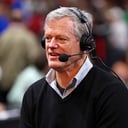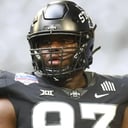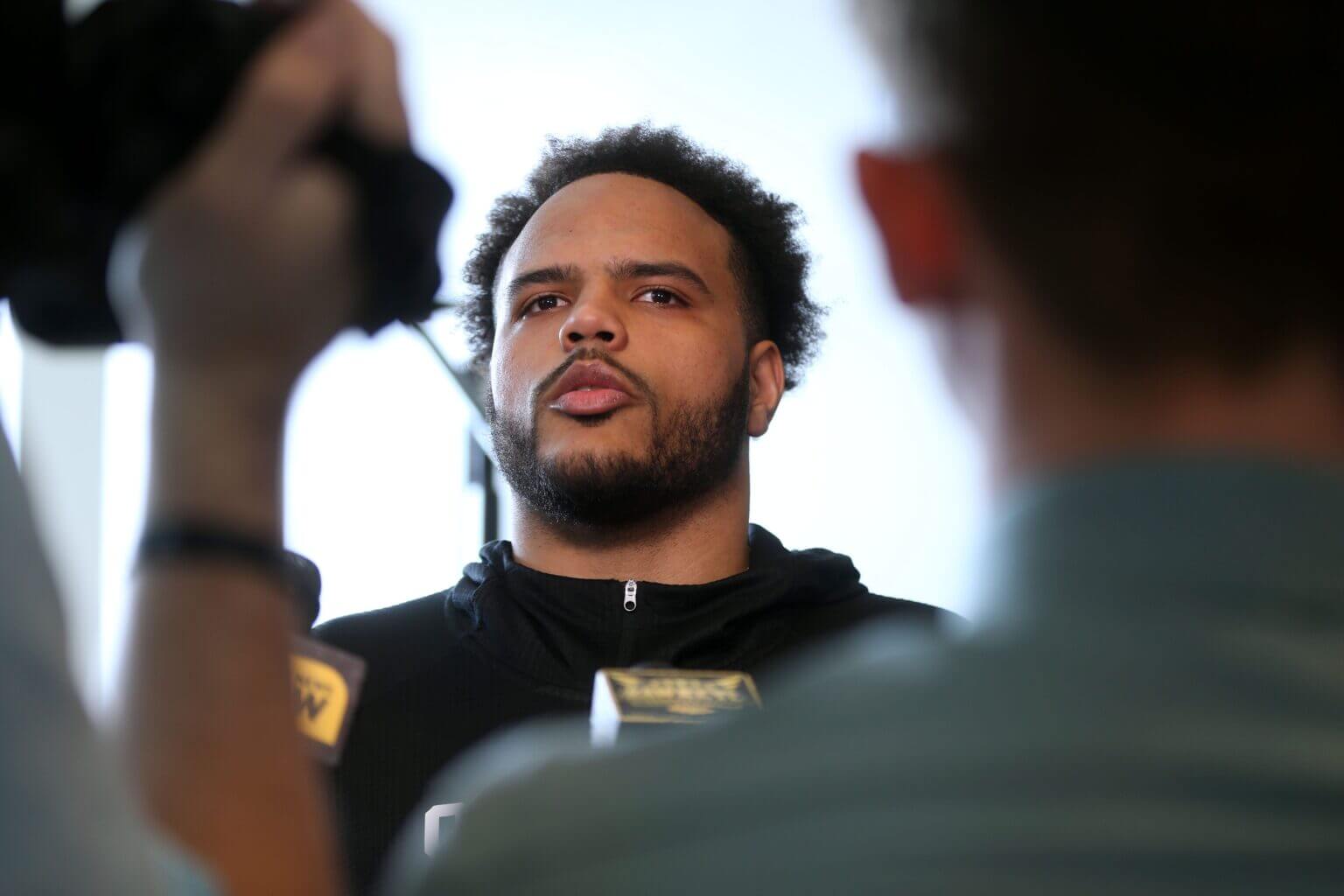IOWA CITY, Iowa — At the Iowa football facility, a place he considered a second home for six years, defensive tackle Noah Shannon left a secured hallway for the public foyer after his pro day workout concluded in March.
Shannon had spent the previous three hours at the most important job interview of his life. The workouts had gone perfectly, especially with sizzling times in the shuttle (4.22 seconds) and 3-cone (7.0 seconds) drills. He stayed afterward to answer questions from NFL scouts about football, his recovery from shoulder surgery and a gambling probe that sidetracked his college football career, but not his life.
Advertisement
“I’ve been explaining just what I went through and everything has been consistent,” Shannon told The Athletic, “not switching up my story trying to say like, ‘Oh, I got screwed over. They did an illegal search on us.’ At the end of the day, I broke a rule. So, no matter how you look at it, I should have been in trouble.”
Shannon was one of more than two dozen athletes at Iowa and Iowa State universities who were penalized by the NCAA last spring following a gambling sting. In early 2023, the Iowa Division of Criminal Investigation (DCI) used geofencing technology to detect wagers placed near athletic facilities on both campuses and found betting information about hundreds of students. The goal, according to both charging affidavits and court testimony, was to investigate whether athletes, coaches and other athletic personnel improperly wagered on or potentially fixed sporting events. Athletes were punished, but the investigation has prompted the promise of a lawsuit and sharp questions about whether the state was right to use the technology without a warrant.
Prosecutors criminally charged 14 athletes for gambling-related offenses, ranging from using aliases while signing up for online accounts underage to using third-party credit cards while hiding their bets. Some of the cases were dropped, and others were resolved with plea bargains for misdemeanor offenses. Shannon was among several athletes who weren’t charged criminally. Still, he was deemed permanently ineligible by the NCAA for betting on his school in the 2023 women’s basketball Final Four. Shannon chose not to reveal the exact amount of his wager because of the upcoming court case but said it was less than $100.
In June, the NCAA reduced its penalties for betting if the wagers weren’t on an athlete’s own team, which reversed its previous ban of gambling on any NCAA-sponsored sport — college or professional. More changes to the penalty structure are possible, NCAA president Charlie Baker told The Athletic. But they would come too late for Shannon.

GO DEEPER
Charlie Baker wants prop bets banned in college sports
“The crime didn’t fit the punishment,” Shannon’s mother, Sarah Real, said. “The entire season or his entire career seemed to be a little harsh for us.”
Van Plumb, a lawyer who represents 26 athletes, including Shannon, and one student manager said he and partner Matt Boles plan to file a federal lawsuit this week against the state of Iowa for violating their civil rights. Plumb told The Athletic the search was not legal because DCI did not have a warrant to use geofencing. Plumb said he also expects the athletes to sue in state court by early next week. In addition, the Sandy Law Firm represents seven other athletes who also plan to file lawsuits.
Advertisement
In a statement, the Iowa Department of Public Safety, which oversees DCI, stood by its use of geofencing of the sports facilities.
“Prior to using the tools provided, the Department of Public Safety conferred with legal counsel to ensure lawful access to and use of the technology,” the department said. “We believe the evidence was obtained in a constitutionally permissible manner. Ultimately it is up to the courts to decide.”
‘An ongoing investigation’
The first salvo in an ever-expanding inquiry was fired May 2, when the Iowa athletic department was notified of “potential criminal conduct related to sports wagering that also suggested possible NCAA violations.” On May 4, the school received a list of the athletes accused of sports wagering. The department alerted the NCAA and sought outside legal counsel the next day, and also publicly disclosed the potential issue.
Before Iowa’s baseball team was set to host Ohio State, a statement from Iowa athletics circulated throughout Duane Banks Field.
“Due to a potential NCAA violation, we withheld some student athletes from competition. We will have no additional comments as this is an ongoing investigation.”
From DCI, the university gained information on 111 people, including 26 athletes from baseball, football, men’s basketball, men’s track and field and wrestling, as well as one full-time athletic department employee. Iowa State acknowledged 15 male athletes from the football, wrestling and track and field squads were accused of wagering on sport, including several who were underage.
Several agencies launched probes, including the universities, the NCAA and Iowa’s DCI in conjunction with the Iowa Racing and Gaming Commission. After a tight-lipped three months, Johnson County (Iowa City) and Story County (Ames) prosecutors combined to charge the 14 athletes with aggravated misdemeanors in August 2023.
Advertisement
The roots of the investigation were dug in May 2019 when Iowa became the 11th U.S. state to legalize sports gambling for people over 21. In fall 2022, DCI officials began training on software designed to fight gambling fraud from a Canadian company called GeoComply. Its technology, called Kibana, is so precise it can spot electronic bets with account numbers conducted anywhere.
In early 2023, according to court records, DCI special agent Brian Sanger first placed a geofence around a University of Iowa dorm but was denied permission to launch an investigation by a pair of supervisors. Sanger’s DCI’s Special Enforcement Operations Bureau then chose another target.
Sanger’s unit put a geofence around athletic buildings at Iowa and Iowa State to gain gambling information. After notifying his superiors of what he learned, Sanger was given the go-ahead to launch an investigation but never obtained a warrant to conduct either search.
The fallout
Before the probe’s specifics came to light, many of the athletes took criminal plea bargains in either Story or Johnson counties. Those charges had no impact on NCAA penalties. Anyone gambling on their school was subject to a one-year NCAA ban. Anyone wagering on their own team received a lifetime ban. Wagering on other NCAA events received a suspension, and the amount of money wagered on non-NCAA sporting events impacted the penalties.
Iowa State tackle Jake Remsburg, who had a FanDuel account under his mother’s name, pleaded guilty to underage gambling. Of his 273 bets over his ISU career, six were made on NCAA-sanctioned events. Remsburg, now 23, received a six-game penalty last fall.

Jake Remsburg was suspended six games for gambling violations last season. (Bryon Houlgrave / Des Moines Register / USA Today)
Iowa cornerback Jermari Harris and defensive end Chris Reames were not charged but received suspensions of two and six games, respectively. Two Iowa football walk-ons were removed from the team after they were charged with gambling on Iowa football. The Iowa wrestling and Iowa State football teams were hit particularly hard. Although no Iowa wrestler was charged, three NCAA qualifiers and two All-Americans were out for the season. The Cyclones lost starting quarterback Hunter Dekkers, running back Jirehl Brock, tight end DeShawn Hanika and defensive tackle Isaiah Lee for the season.
The Hawkeyes’ wrestling team finished fifth nationally, its worst showing since 2016. The Iowa baseball program lost third-team All-American outfielder Keaton Anthony one month before the NCAA tournament, though he faced no charges. Iowa State lost Big 12 champion wrestler Paniro Johnson, whose charges were later dismissed.
Advertisement
The situation impacted other schools, too. Former Iowa football players Arland Bruce IV and Reggie Bracy transferred to Oklahoma State and Troy, respectively, but both were suspended and neither saw a snap. Bruce, an expected starter who bet on an Iowa football game, is permanently ineligible. Former Iowa men’s basketball player Ahron Ulis left for Nebraska but was forced to sit out the season.
Key details about the state’s investigation emerged through depositions of Sanger and other agents on Jan. 19 in Story County. Special agent Mark Ludwick, a 25-year veteran with DCI, testified that he requested to leave the investigation. He said, according to his deposition, that “DCI conducted an illegal search of Iowa student athletes and dozens of others’ personal online account information because the agency did not obtain a GeoFence Warrant as well as lacked reasonable, articulable suspicion to conduct such a search.”
Plumb added in a court filing: “This was done without a warrant, tips, complaints, or evidence that illegal gambling was occurring.”

GO DEEPER
Attorney claims ‘warrantless search’ led to Iowa, ISU gambling probe
Within a week of the deposition publishing by WHO-TV — then confirmed in a Story County court filing Feb. 27 dismissing charges against four Iowa State athletes — GeoComply informed DCI it would disable its Kibana access. GeoComply wrote to DCI that it “exceeded the scope of its permitted use” of its product. In that dismissal filing, Story County prosecutors “investigated the allegations and confirmed them to be accurate. “
All along, Iowa Gov. Kim Reynolds has backed DCI and its actions. At a news conference, Reynolds said,“They did their jobs. They received inquiries about an issue and they do what they do. They responded to that, and I think they were surprised at some of the results that they found. They don’t check in with me, but I support wholeheartedly the department and the decisions that were made.”
“The fact that our Governor and law enforcement is backing these guys is incredible to me because there’s no jurisdiction in a state of the union where they have said you can use a geofence without a warrant,” Plumb told The Athletic. “And even with a warrant, it has to be specific enough to let you know what you’re looking for.”

Noah Shannon started at Iowa for two seasons before he was deemed ineligible in 2023. (Julia Hansen / Iowa City Press-Citizen / USA Today)
Shannon’s journey
Shannon, from near Aurora, Ill., developed into an indispensable performer in Iowa’s elite defense and twice earned honorable mention All-Big Ten honors.
In the second game of the 2022 season, Shannon suffered a torn labrum. He wore a shoulder harness and battled through pain to start every game. At season’s end, Shannon weighed pursuing the NFL or surgery and a sixth season at Iowa. Team doctor Brian Wolf recommended surgery.
Advertisement
“It was the right thing to do,” Shannon said.
In January 2023, Wolf repaired Shannon’s labrum and reconstructed his AC joint. It involved an eight-month recovery process.
That spring, Iowa coach Kirk Ferentz informed Shannon he would represent the program at Big Ten media days. On his spring break, Shannon and his mother bought his suit for the event.
“It was an amazing honor for him to be selected,” Real said. “He’s been an amazing player for the university, and it was humbling to see that hard work pay off and that honor. And then to be taken away …”
The Iowa women’s basketball team starring Caitlin Clark qualified for the 2023 Final Four, and several athletes, including Shannon, joined in the euphoria. Barely four weeks later, Shannon’s bet showed up on the DCI sting operation. With the investigation lingering, Shannon opted out of Big Ten media days to avoid the spotlight.
Shortly before the 2023 opener, Shannon was suspended for the season. He appealed the ruling unsuccessfully. Shannon already had his degree, but he stayed with the program as a student assistant.
“It was difficult to show up, not be on the field and not be able to help the team out,” Real said, “but he still showed up.”
A glimmer of hope arrived Oct. 4 when the NCAA Division I Council said it would consider reinstatement guidelines for athletes engaged in sports wagering. The recommendation was reinstatement for anyone who had not bet on their own team. Shannon received NCAA clearance to return to practice and waited for final approval. It never came.
After feedback, the council pushed back the ruling two weeks and then declined to allow athletes who bet on their schools to gain immediate eligibility. Shannon was disappointed, having accepted his fate after his appeal failed then regaining hope with the NCAA’s reconsideration of its rules.
Advertisement
”To have that decision made, that could have crushed some guys’ dreams,” Real said. “But he worked through it.”
Ferentz made Shannon the honorary team captain on senior day last November and complimented his perseverance.
The NCAA reduced its penalties last summer in the wake of the Iowa-Iowa State betting scandal. Nearly a year later, Baker said the organization would consider further adjustments to punishment for sports wagering.
“I think people want to be fair here,” Baker told The Athletic at the women’s basketball Final Four in Cleveland this month. “But there’s an integrity of the game issue that’s also important. I have a feeling that betting on your own team, betting on your own sport, are going to remain enormously problematic.
“In our perfect world, student-athletes don’t bet on sports, at least not on college sports. But we need to come up with a framework around that that’s going to be sort of reality-based and deal with some of the issues associated with modest indiscretions.”
Shannon’s year was lost on the field, but he said he used the time as an opportunity to grow. He said he has gained maturity and become more spiritual through his faith. His indiscretion may have halted his college football career, but his penalty may actually aid him physically in his NFL pursuit.
“My grandma always says maybe God was sitting you out so you can heal properly,” Shannon said. “I definitely do think it’ll help out in the long run.”
Shannon has discussed NFL opportunities with the Vikings, Colts and Raiders after his pro day on March 18 and participated in a workout at the Bears’ facility earlier this month. It’s unlikely he becomes a draft pick, but Shannon could land a free-agent deal this weekend.
“Any team that’s willing to give me an opportunity, I’m gonna do everything I can with it,” he said. “I’m not looking back.”
(Illustration: Dan Goldfarb / The Athletic; photos by Ethan Miller, C. Morgan Engel / Getty Images, Justin Hayworth / AP)
